“Once you’re at rock bottom, the only way forward is up. But the bottom doesn’t have to be all dark and gloomy. If you can stand and look up, you’ll see the light of hope there.” — Ichiban Kasuga
When it comes to modern day heroes, I think the bar of our expectations has been set just a little too high. Think back on your Shepards, your Geralts, Cloud Strifes, Warden Commanders or Darth Revans and you will find a pantheon of larger-than-life characters whose uncanny abilities, combat prowess, abundant charisma and singular backstories make them difficult to imagine as anything but people bound to save the day.
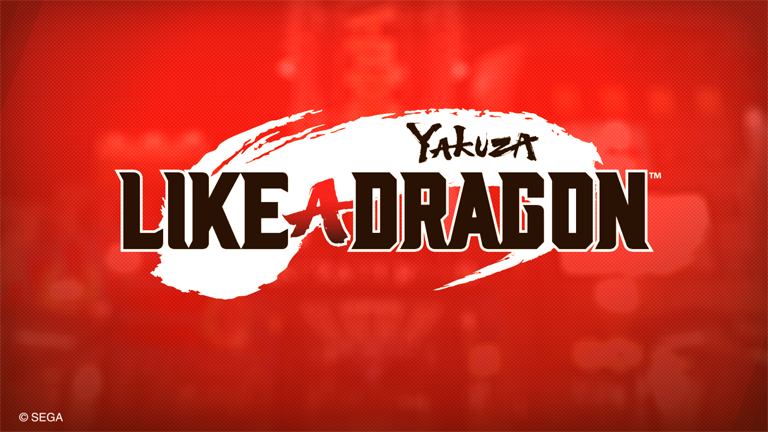
These characters are imbued with so many astounding traits that it's easy to forget true heroism isn't about being exceptional: true heroism is doing something exceptional – often in spite your own limitations... Thankfully, Ichiban Kasuga – the protagonist of Ryu Ga Gotoku's Yakuza: Like a Dragon – exists to remind us that everyday mundanity and heroism are not mutually exclusive.
"At that moment I saw my life's path. It was following this man."
In terms of strengths, Ichiban doesn't have many. Oh, he's a nice enough guy and – as a Yakuza foot soldier – he can hold his own in a fight, is loyal to the Arakawa family and abides by his own (somewhat naive and idealistic) moral compass. But he has no ambition or drive and is seen as little more than an errand boy by his senpai.
His blind devotion to the Arakawas makes him the ideal fall guy for a crime he didn't commit and he spends 18 years in prison clinging to the hope his loyalty will have the family welcome him back with open arms. When he is finally released, however, not only is he not accepted back into the fold, but the person he trusted most nearly kills him and dumps him, bloody and dispirited, at a homeless camp in distant Yokohama... And it is there – amidst society's cast-offs – that we first catch a glimpse of Ichiban's potential. Because he doesn't give up. He doesn't just get back on his feet. He stubbornly clings to his beliefs and starts slowly, grudgingly, clawing his way to heights you would not expect from a middle-aged guy with a goofy haircut dressed in a dirty suit with a bullet hole through the breast pocket.
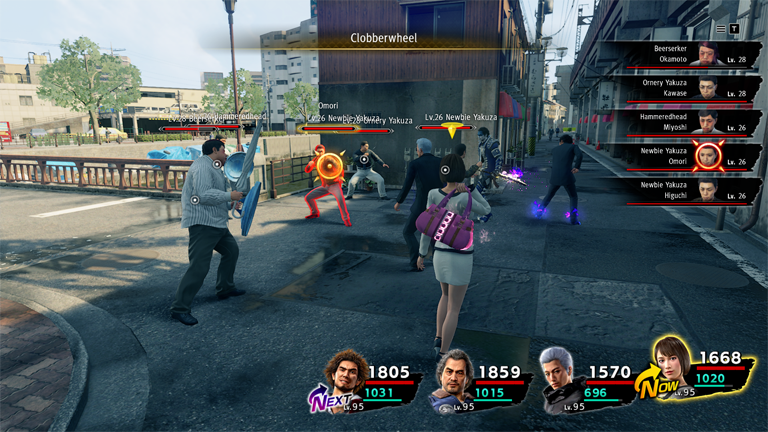
Ryu Ga Gotoku has been making Yakuza games for 18 years now and Like a Dragon retains most of the mechanics of the (seven?) games before it. In between lengthy – but well-written and voiced, beautifully animated – cutscenes, you are given free reign of Yokohama (and later Osaka and Tokyo), to explore, engage in random fights, discover treasure, pick up side quests or play a mini-game from Like a Dragon's fairly extensive roster.
The one thing that is different about Like a Dragon is that, unlike previous entries (which were action games at heart), this Yakuza settles its fights through turn-based, party-oriented combat of the sort found in your run-of-the-mill JRPGs (HPs, MPs, special attacks and all).
"I'm sure all of us here are a little crazy. But that's the best part of being friends."
While, at the outset, Ichiban struggles on his lonesome, his quirky personality gradually attracts a loyal cadre of followers. Before long, you'll make the acquaintance of Nanba, a down-on-his-luck former nurse who became homeless; Adachi, a grizzled detective fired days before his retirement; Saeko, the shrewd manager of a hostess bar; and others, who – for reasons of their own – are drawn to Ichiban's crusade by his straightforward optimism and single-minded refusal to quit.
Honestly, while the writing of Like a Dragon is consistently solid, it's the characters that make the game truly worthwhile. Ichiban's friends aren't perfect (well, maybe aside from Joon-gi Han – but then, that's kind of his schtick); they're not idealized distillments of the human condition... They're ordinary. And, in a field flooded with exceptionality, that is what makes them unique.
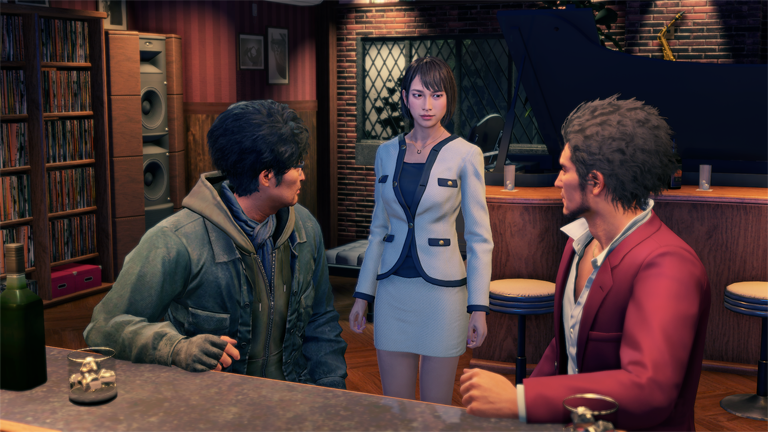
In the many instances of Simply Hanging Out, no one in Like a Dragon will regale you with amazing feats they performed in the past... But Saeko and Adachi might debate the ins and outs of underwear; Zhao may subvert a mention of Kung Fu to score some snacks; Ichiban can bashfully fill you in on why his back sports a lowly dragonfish – instead of a proper dragon; or a discussion about nicknames may turn into an excuse to eat out; and, you know what? Not only is it believable and refreshing – more often than not, it's also downright heartwarming and hilarious.
Every member of Ichiban's party has a loyalty level that can be raised through activities or gifts, which eventually leads to being able to resolve a personal issue of theirs. At a certain point in the game, party members can also switch out their "jobs" (classes) to pick up new abilities, a few of which they retain even when switching career tracks (which can lead to the surprising mash-up of a pop idol going full-Rambo with a machine gun or a decked-to-the-nines host shouldering a sledge hammer to toss some dynamite).
"I can have a dream, can't I? You don't have to laugh at it. A dream is what keeps you going."
Between the main plot, 52 substories (side quests), restaurants you can eat out at with your party (which give you stat boots if you order the right mix of dishes); 24 mini-games ranging from the simple (such as batting practice, karaoke, golf or darts) to the elaborate (like Dragon Kart racing or company management); a decent crafting system, Part-Time Hero errands (such as toilet paper delivery or tracking down stray cats); two sewer (dungeon) raids and a hidden, 30-storie high battle arena, Like a Dragon has all the traits of an all-you-can-eat buffet, making it easy to spend nearly 100 hours on a single playthrough (my first, in which I did everything aside from some of the mini-games, clocked in at about 84).
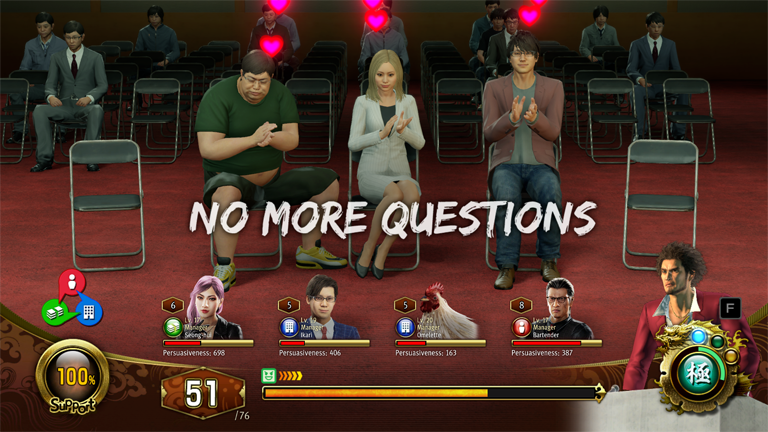
The game excels at keeping you occupied and while its JRPG roots do mean that the mini-games, challenges and combat get grindy and repetitive fairly quick; the former are entirely optional and the latter at least lets you swap out character jobs so you don't have to look at the same attack animations over and over (if you don't feel like it).
If you are not a completionist, you can probably get through the main plot and more interesting side missions in 40 hours and change (which will still involve a bit of grinding to level up for bosses and more difficult opponents, but not nearly enough to make you tire of the game). Worse comes to worst, you can always score a trainer and crank up the job XP to 16 times standard (as always, I recommend Fling).
"You've got a good heart, and you're doing the best you can. It doesn't matter where you were born."
In terms of presentation and programming, you won't find a step out of place in Like a Dragon: the animation is fluid and lifelike, graphics have that trademark deceptively-simple, Japanese style and the game hums along like a finely-tuned engine with no hitches or crashes throughout. Sometimes, in densely populated areas, you might experience a bit of slowdown, but — that's about it.
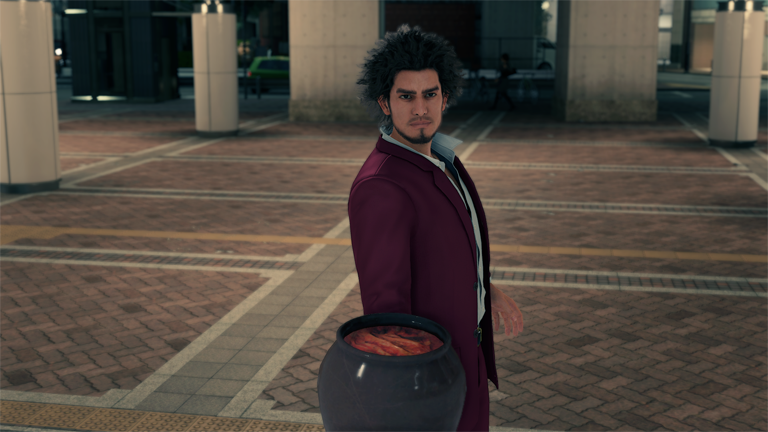
At the end of the day, the game's greatest strength is its tone and the banal wholesomeness of its message. Yes, like all Yakuza-centric fiction, its writing can (and often does) get a little long-winded and preachy, to the point where you can go make yourself a snack, come back and still be watching the same, over-acted cutscene... But the fact remains that the notions central to Like a Dragon's story are ones we simply don't see enough of nowadays. Family. Loyalty. Friendship. Helping those less fortunate than yourself. Extending a hand without hope of reward. Simply having a buddy's back... It's a nice departure from the self-serving snark that passes for modern game values — and it fits Ichiban Kasuga's story to a tee.
If you want a good narrative that deals with serious topics and has a sense of humor (but doesn't feel the need to punctuate everything with a joke); want to experience some genuinely heartfelt moments with a worthwhile cast of characters; stroll through beautiful, realistic approximations of three Japanese cities; or simply help a wrongfully convicted felon prove he has what it takes to be so much more, I highly recommend giving Yakuza: Like a Dragon a try.
It might not be a perfect game, but it's heart is definitely in the right place. And that, in my book, makes it more worthwhile than most.
Pig Recommends:
- -even if overalls clash with your fashion sense, grab a level of Foreman as soon as you can; its Demolish ability is the only way to get around improvised barriers in the sewers and hidden black market areas in town (and is one of those skills that can be used by any other job);
